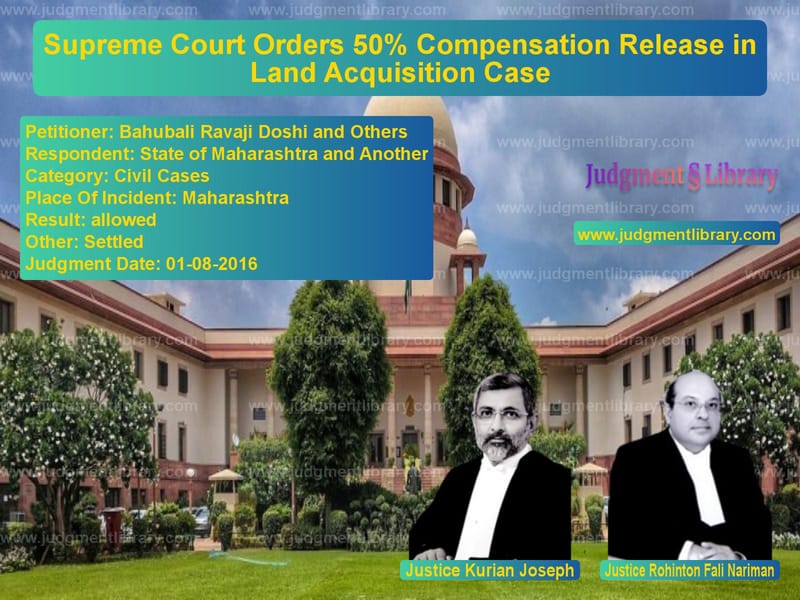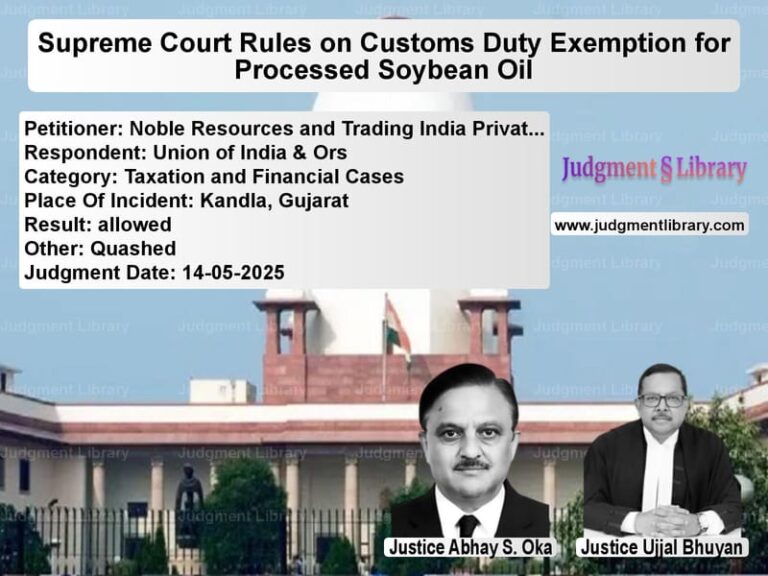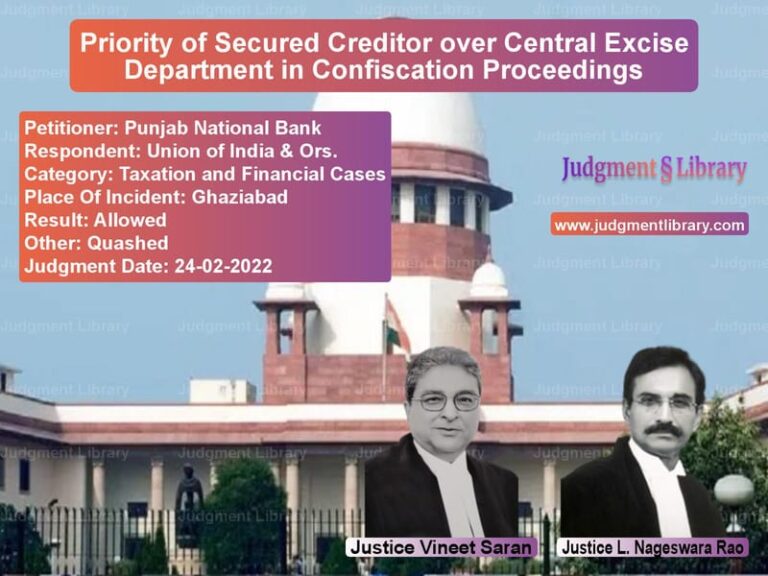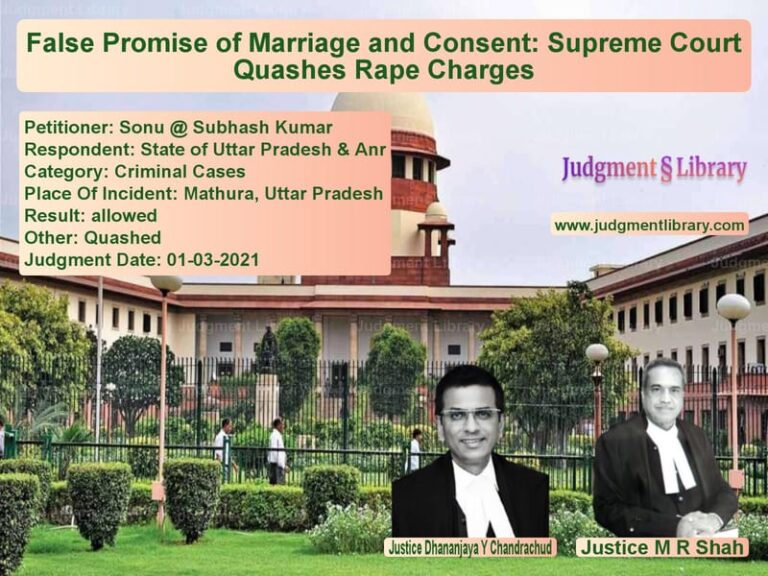Supreme Court Orders 50% Compensation Release in Land Acquisition Case
The case of Bahubali Ravaji Doshi and Others v. State of Maharashtra and Another dealt with the disbursement of compensation in a land acquisition dispute. The Supreme Court, in its judgment dated August 1, 2016, directed the Reference Court to release 50% of the deposited compensation amount without security and the remaining 50% with security, ensuring that the landowners received their dues while protecting the interests of the state.
Background of the Case
The dispute arose when the State of Maharashtra acquired land owned by the appellants. The compensation determined for the acquired land was deposited with the Reference Court, but the appellants sought its immediate release. The Reference Court had not yet issued orders regarding the disbursement, leading the landowners to approach the Supreme Court.
In several connected matters, the Supreme Court had previously directed the Reference Court to follow a uniform approach for disbursing compensation. The appellants requested that their case be treated similarly to those already decided by the Court.
Legal Issues
The Supreme Court examined the following issues:
- Whether the appellants were entitled to the immediate release of compensation deposited with the Reference Court.
- What percentage of the compensation should be released without security?
- Whether a uniform approach should be applied to all similar cases to avoid unnecessary litigation.
Petitioner’s Arguments (Bahubali Ravaji Doshi and Others)
The petitioners argued:
- The compensation had been deposited, and the delay in its release was unjustified.
- Other landowners in similar cases had already received 50% of their compensation without security.
- Their case should be treated in the same manner to ensure uniformity and fairness.
Respondent’s Arguments (State of Maharashtra)
The respondents contended:
- Compensation payments should be subject to legal scrutiny to prevent misuse.
- The Reference Court should have the authority to determine the disbursement terms.
- Releasing the entire compensation amount without security might pose financial risks to the state.
Supreme Court’s Observations and Ruling
1. Uniform Approach for Compensation Release
The Supreme Court emphasized that similar cases must be treated uniformly:
“In all connected matters, this Court has directed the Reference Court to release 50% of the amount deposited by the State without security and the remaining 50% with security to the satisfaction of the Court.”
The Court held that the same approach should be applied in this case to maintain consistency.
2. Protection of Both Landowners and the State
The Court balanced the interests of both parties:
“That order will govern the case of the appellants as well. The High Court may adopt the same pattern in all the connected cases, so that parties do not have to unnecessarily travel to this Court.”
This ruling ensured that landowners received timely compensation while preventing financial risks to the state.
3. Expedited Resolution
The Court directed:
“The High Court may adopt the same pattern in all the connected cases, so that parties do not have to unnecessarily travel to this Court.”
By setting a precedent, the Court aimed to reduce the burden of repetitive litigation.
Final Verdict
The Supreme Court disposed of the appeal with the following directives:
- The Reference Court must release 50% of the deposited compensation to the landowners without requiring security.
- The remaining 50% must be released with security to the satisfaction of the Court.
- The same approach should be followed in all similar cases to prevent unnecessary litigation.
Key Takeaways
- The Supreme Court ensured fairness by adopting a uniform approach to land acquisition compensation cases.
- The ruling balanced the rights of landowners and the financial concerns of the state.
- Similar cases should be resolved based on established precedents to avoid unnecessary delays.
Impact of the Judgment
The ruling set a precedent for land acquisition compensation cases in India. It reinforced that:
- Compensation should be released in a timely manner.
- Courts must ensure a fair balance between the rights of landowners and government interests.
- Legal uniformity reduces unnecessary appeals and speeds up the resolution of similar disputes.
In conclusion, the Supreme Court’s decision in Bahubali Ravaji Doshi and Others v. State of Maharashtra reaffirmed the importance of consistency in legal decisions regarding compensation for land acquisition. The ruling ensured that landowners received their dues without unnecessary delays while maintaining safeguards to protect state finances.
Don’t miss out on the full details! Download the complete judgment in PDF format below and gain valuable insights instantly!
Download Judgment: Bahubali Ravaji Dosh vs State of Maharashtra Supreme Court of India Judgment Dated 01-08-2016-1741878447194.pdf
Direct Downlaod Judgment: Direct downlaod this Judgment
See all petitions in Property Disputes
See all petitions in Judgment by Kurian Joseph
See all petitions in Judgment by Rohinton Fali Nariman
See all petitions in allowed
See all petitions in settled
See all petitions in supreme court of India judgments August 2016
See all petitions in 2016 judgments
See all posts in Civil Cases Category
See all allowed petitions in Civil Cases Category
See all Dismissed petitions in Civil Cases Category
See all partially allowed petitions in Civil Cases Category







